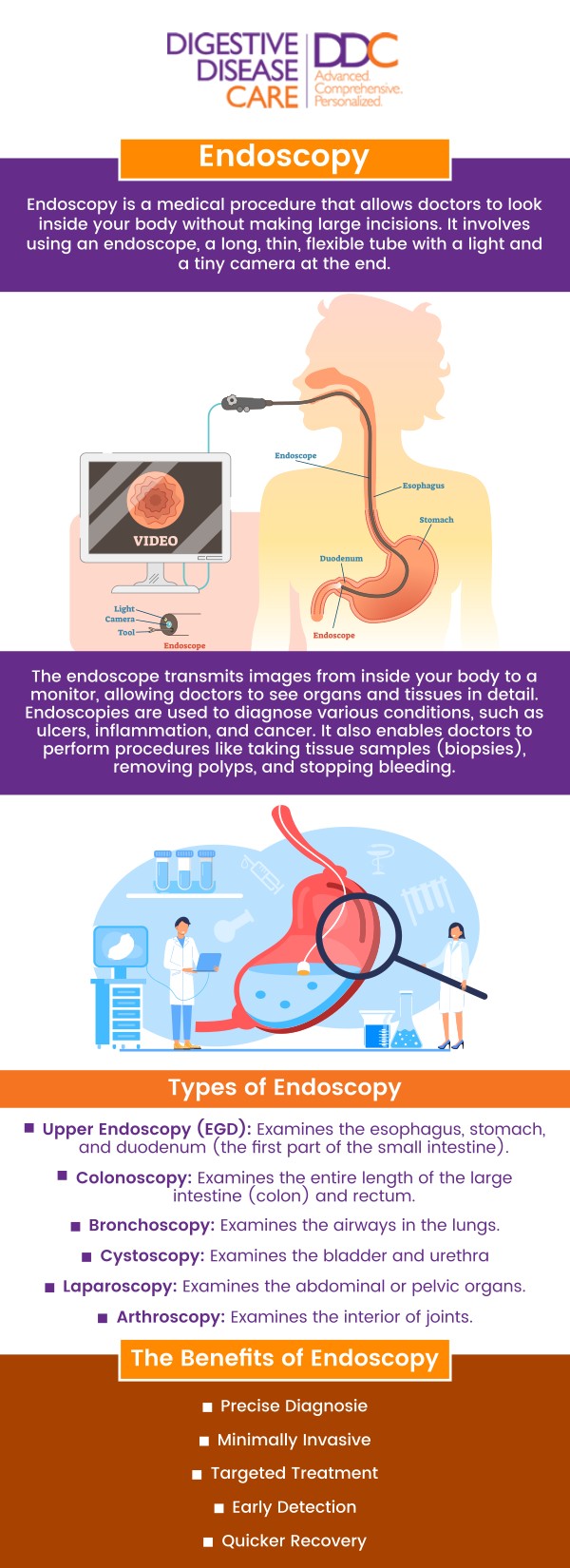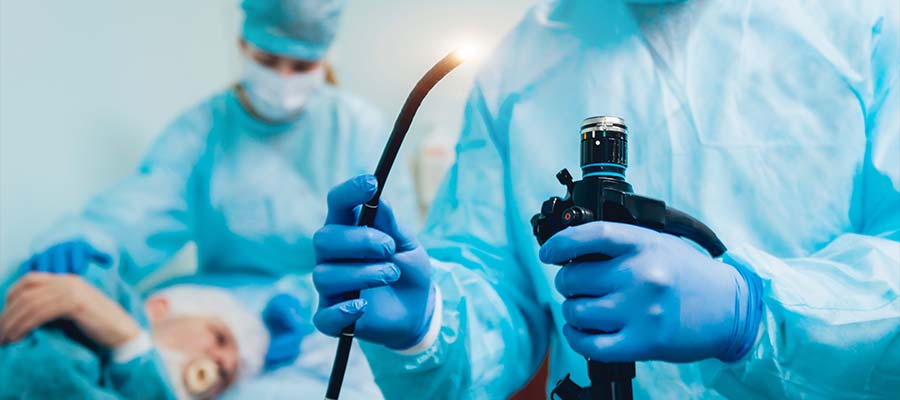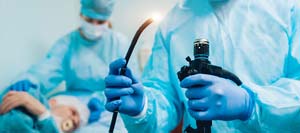Top Endoscopy Specialist in Forest Hills, NY
Endoscopes are a very important component of preventative care in allowing physicians to have visibility and access to previously difficult-to-reach areas of the body including inside of particular organs without having to use open surgery or more invasive options. They can be used just to allow for the physician to see what is going on in the particular area of the body that is causing concern with a tiny camera attached, or make it much easier to take small tissue samples from those areas that will be biopsied to determine the presence of damaged or abnormal tissue. Visit Digestive Disease Care (DDC) to get comprehensive and specialized care from a board-certified gastroenterologist. For more information, contact us today or book an appointment online. We are conveniently located at 107-40 Queens Blvd Ground Floor Forest Hills, NY 11375.




Table of Contents:
What can an endoscopy diagnose?
Are there any risks associated with an endoscopy?
How many types of endoscopes are there?
What are the signs that you should have an endoscopy?
There are so many different types of endoscopies that are regularly performed and are used to identify and diagnose issues or diseases within the heart, esophagus, stomach, colon, abdomen, nose, throat, ears, urinary tract, and joints. They are effective in providing visibility to diagnose cancers in all of these body parts, screening to prevent cancer, determining the cause of symptoms, and providing certain courses of treatment. An endoscopy allows for physicians to have increased visibility of abnormal masses and lumps, enabling biopsies to be taken so that the tissue can be further analyzed, screening for cancer or other potential concerns. Other commonly diagnosed conditions through an endoscopy include celiac disease, ulcers, gastroesophageal reflux disease (acid reflux), and Crohn’s disease.
An endoscopy is a much safer and low-risk option for providing visibility to hard-to-reach areas of the body when compared to an open surgery. With that being said, as with all medical procedures, endoscopies still come with minor risks of complications such as infection or bleeding. These are typically considered to be fairly mild complications and can be quickly treated. More severe complications of an endoscopy are very rare but possible and include perforation and chest pain. Patients undergoing an endoscopy will also typically have sedation or anesthesia used for the procedure which can lead to its own complications in some patients, but these complications are rare as well. The risks for developing complications will vary depending on the exact endoscopy that is being performed as well as the health condition of the patient, but all potential risks will be clearly outlined by the physician performing the endoscopy to ensure that every single patient is well-informed. In the majority of cases, the risk of complications during an endoscopy is very rare and they are a safe and effective option for providing preventative care and treatment.
There are many different types of endoscopes that vary depending on which part of the body requires medical attention. Every type will consist of a tube-like instrument that is inserted into the specified body part in order to provide visibility for diagnoses or treatment. The most common types of endoscopies include:
• Colonoscopy
• Upper endoscopy
• Bronchoscopy
• Laryngoscopy
• Thoracoscopy
• Cystoscopy
• Mediastinoscopy
• Laparoscopy
All of these different types of endoscopies are used to provide visibility to parts of the body such as the ears, nose, throat, esophagus, heart, stomach, abdomen, urinary tract, colon, and joints. Many endoscopes can be inserted into the body through already existing openings such as the mouth, urethra, or anus, but may also need to be inserted through a small surgical incision depending on the type of procedure that is being used. In almost every case, sedation or anesthesia will be used for the comfort of the patient.
Endoscopies are used to determine the cause of symptoms or as a means of screening for various health conditions, particularly cancer. Some symptoms that are commonly experienced that indicate the need for an upper endoscopy include ulcers, bleeding along the digestive tract, stomach pain, changes in bowel movements or habits, growths in the colon, and difficulty swallowing. Specific causes for severe heartburn and acid reflux are frequently identified through endoscopies as well. Other symptoms that could lead to the recommendation of endoscopy include blockages along the gastrointestinal tract and chronic inflammatory bowel diseases such as Crohn’s and ulcerative colitis that can be diagnosed through a biopsy of the tissue using an endoscope. Patients who are at an increased risk of developing cancer or have a family history of cancer may be recommended to have endoscopies performed more regularly as preventative care.
We have convenient locations to serve you in Melville NY, New Hyde Park NY, Forest Hills NY, Jericho NY, Mineola NY, Lake Success NY, Babylon NY, East Setauket NY, Massapequa NY, Riverhead NY and BEYOND.

Check Out Our 5 Star Reviews


Additional Services You May Like

Additional Services You May Like
- Abdominal Pain
- Acid Reflux
- Barretts Esophagus
- Bloating
- Capsule Endoscopy
- Celiac Disease
- Colon Cancer Screening
- Colonoscopy
- Constipation
- Crohns Disease
- Diarrhea
- Diverticulitis
- Esophageal PH Monitoring
- Fatty Liver
- Fibroscan
- Gallstones
- Gastroenterologist
- Gastric Chest Pain
- Gluten Intolerance
- Hemorrhoid
- Hemorrhoid Banding
- Hepatitis
- Irritable Bowel Syndrome
- Lactose Intolerance
- Pancreatitis
- Polyps
- Rectal Bleeding
- Stomach
- Ulcerative Colitis
- GI Urgent Care





